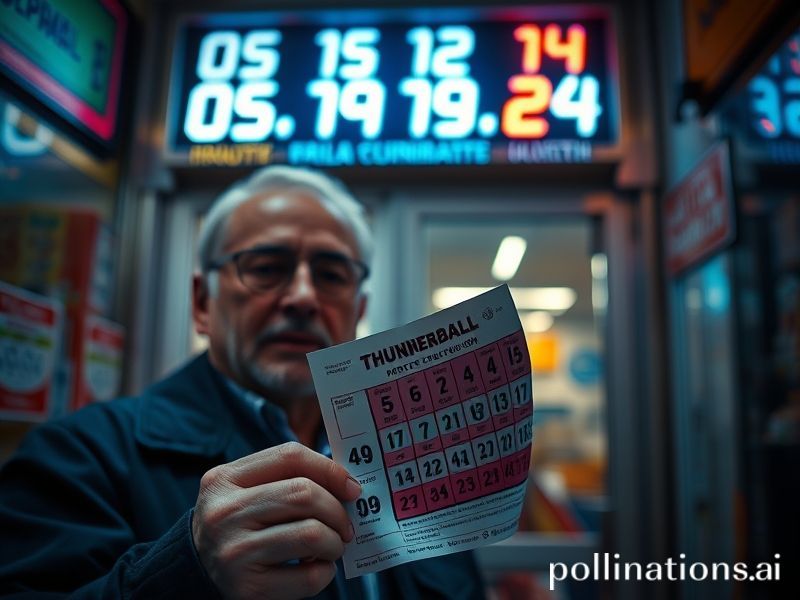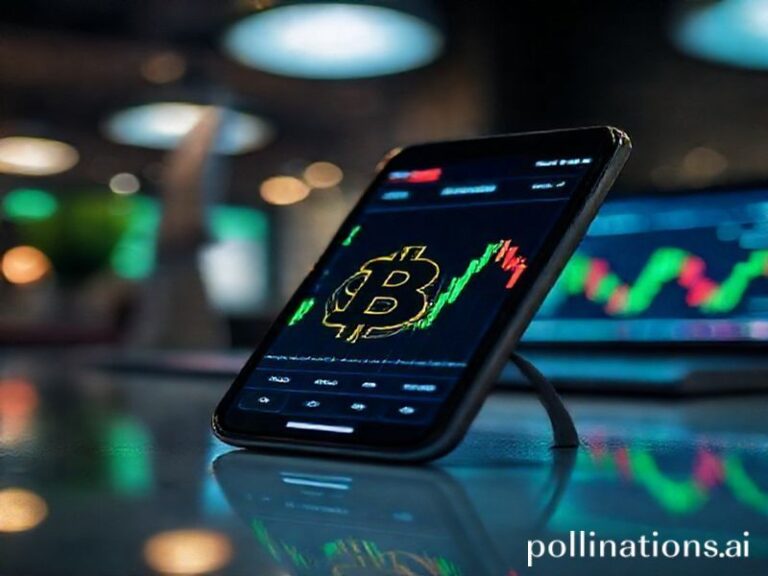Thunderball Lotto Results: How a Humble £500k British Win Echoes Across a Burning World
**Thunderball Lotto Results: The Global Echo of a Modest British Boom**
LONDON—While the world’s gaze is fixed on missile trajectories, crypto collapses, and the slow-motion demolition of various rainforests, Britain’s National Lottery quietly coughed up Tuesday’s Thunderball numbers: 06, 09, 14, 23, 39, and the Thunderball itself, 03. A £500,000 jackpot—pocket change next to America’s billion-dollar Powerball orgies—went to a single ticket holder somewhere in the damp postcode wilds of northern England. Internationally, the event registered somewhere between “Belgian regional election” and “new flavor of Pringles,” yet the ripples deserve a moment of our jaded attention.
First, the math: £500,000 converts to roughly €580,000, $620,000, or 1.7 billion sputtering Lebanese pounds. In Zurich, it buys a cramped two-bedroom overlooking a quiet cocaine launderette; in Lagos, it buys a small governor; in Kyiv, it buys hope with optional sandbags. The winner—identity embargoed by Camelot until they decide whether to claim anonymously or parade their windfall on daytime television—has already become another data point in the global inequality index, a speck of glitter on the spreadsheet separating the precarious from the merely comfortable.
Across continental Europe, Tuesday’s draw barely dented the news cycle. The Italians were busy watching Giorgia Meloni auction migrant life jackets on eBay; the French were striking over the right to retire at 42 while still indignant; Germans were calculating how many Ukrainian heat pumps equal one abandoned Russian super-yacht. Meanwhile, EuroMillions—Thunderball’s richer, flashier cousin—continues to pool nations together in a grand cooperative fantasy that the EU itself can only dream of. Thunderball, by contrast, is the introverted sibling who brings a cheese sandwich to the potluck: same gambling gene, smaller appetite.
Still, the draw is a reminder that even amid stagflation, proxy wars, and the creeping suspicion that democracy was a two-century pilot episode, humans will risk couch-cushion change for the statistically impossible. Globally, lottery spending hit $330 billion last year—more than the GDP of Finland, and roughly what Amazon avoids in tax by registering its headquarters on the dark side of the moon. The World Bank, ever the killjoy, notes that households in the bottom income quintile spend up to 10 % of disposable income on tickets, a regressive tithe enthusiastically collected by governments that simultaneously sermonize about financial literacy. In effect, Thunderball is a privately administered austerity program with better jingles.
Emerging markets watch these rituals with a mixture of envy and colonial déjà vu. Kenya’s Safaricom pioneered mobile lotteries so efficient that citizens can lose money without the humiliation of standing in line; Manila’s sweepstakes finance everything from hospital beds to officials’ second wives. Yet the British insist on televised tumbler machines that look like oversized gumball dispensers—an affectionate nod to the 1990s, when optimism was still taxable.
Climate diplomats, forever hunting for innovative funding, have floated the idea of a “Global Green Lottery,” whose proceeds would underwrite solar farms and relocate the first nation to drown. Critics argue it moralizes losing, but the same was said about indulgences, and those financed the Renaissance. Meanwhile, crypto bros propose decentralized “no-loss” lotteries on the blockchain, where your ticket doubles as an entry to a Ponzi scheme—efficiency at its finest.
What does Tuesday’s £500,000 actually mean? For the winner, a modest mortgage liberation, maybe a Tesla and a holiday to somewhere visibly sinking. For the rest of us, another spin of the planetary fruit machine, another reassurance that order—statistical, cosmic, or merely bureaucratic—still has a sense of humor. Somewhere in the North of England, someone is discovering that money can’t buy happiness, but it can purchase a superior brand of existential dread.
The Thunderball rolls again on Saturday. Buy a ticket, or simply continue your longstanding personal lottery of crossing the road while staring at your phone. The odds, darling, are almost identical.







